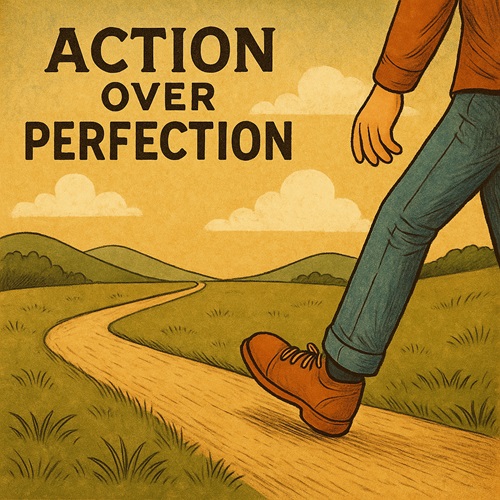Think It’s Not the Right Time? How to Stop Procrastinating and Take Action Now!
Have you ever caught yourself thinking, “I’ll start when I’m more ready,” or “This just isn’t the right time”? If that sounds familiar, you’re not alone. Many of us put our dreams and goals on hold, not because we’re lazy or incapable, but because we’re waiting for the “perfect” moment that never comes.

But let’s be clear: this isn’t about the kind of perfectionism that pushes people to work harder and harder, often at the cost of their well-being. That type can lead to anxiety, burnout, and even depression.
What we’re talking about here is a quieter, more deceptive kind of perfectionism. It convinces us we need better timing, more resources, or improved skills before we can begin. And unfortunately, it often leads to the biggest hurdle in the path of success: procrastination.
This concept ties closely to a recent post I wrote titled 10 Effective Ways to Stop Procrastinating, where I explain how our minds trick us into believing that delays are justified. One of the key insights from that post is this: you don’t need to see the whole picture before you begin.
That leads us perfectly into the next topic:
One Step at a Time
One Step at a Time
Just like I’ve emphasized in many of my Law of Attraction posts, even though this topic leans more on the practical side, the core principle remains the same: You don’t need to see the whole picture to start. Taking small, consistent steps is often the most powerful way forward.

Let me share something personal with you. A while back, I decided to commit to losing weight—not just for appearance, but for health and energy. At first, the goal felt massive and honestly a bit overwhelming. Thinking about all the changes I had to make with diet, exercise, and mindset was enough to make me want to quit before I had even started.
But I reminded myself of the same principle I talk about here: just begin. So, I did. I didn’t commit to an intense workout schedule or an impossible diet. I started with 15–20 minutes of physical activity a day and slowly adjusted my eating habits. Nothing extreme, just small, manageable shifts.
And something amazing happened. Once I took that first step, the motivation followed. Each time I showed up for myself, I felt a bit more capable. The act of doing created its own momentum. What once seemed impossible slowly became part of my routine.
This experience helped me truly understand why tasks often feel so daunting when we look at them as a whole. Our minds trick us into believing that everything needs to be done at once or not at all. But the truth is, breaking things down into bite-sized actions makes the journey less intimidating—and more achievable.
That’s why practical tools like the Pomodoro Technique are so effective. Instead of sitting down with the expectation to finish everything, you simply commit to focused work for 25 minutes. No pressure. Just progress. And more often than not, that little burst of action is enough to build momentum for the next step.
Remember, motivation doesn’t always come before action. More often, it follows it.
Bad Workman Never Gets a Good Tool
You’ve probably heard the saying, “A bad workman always blames his tools.” While it might sound a little blunt, there’s a deep truth hidden in it—it’s not the tools that make the work happen; it’s the willingness to begin.

So many people delay starting because they believe they need the perfect setup:
- “I don’t have the right software or expertise yet.”
- “I need a better laptop, a quieter workspace, or upgraded equipment.”
- “Once I learn this one more thing, I’ll finally start.”
But here’s what I’ve learned: you don’t discover what you truly need until you begin. And once you do, the motivation to gain new skills, find better tools, and seek smarter solutions comes naturally—because now, your mind is engaged, your energy is activated, and your purpose is in motion.
When I first began building this blog, I didn’t have premium tools, expensive software, or formal training in web design or SEO. I just started. And as I moved forward—post by post, mistake by mistake—I learned. I picked up the tools along the way. I didn’t plan the whole journey before starting; I found the map as I walked the path.
That’s the part most people overlook: starting is what opens the path. When you’re stuck in planning mode, it’s easy to imagine a hundred things you might need. But when you’re in motion, you quickly discover what actually matters—and you naturally become curious and hungry for just the right next piece of the puzzle.
You don’t need to be tech-savvy. You don’t need a fancy camera. You don’t need the latest tools or certifications to begin.
You just need to begin.
Because skills are sharpened through doing, and tools become valuable only after you’ve picked up the task. Waiting for perfection is often procrastination in disguise. Action, not preparation, is the real catalyst for progress.
So stop worrying about the perfect tool. Start with what you have. Trust that what you need next will reveal itself once you’re in motion.
Success doesn’t come from having everything—it comes from doing something with what you’ve already got.
My Story: How I Delayed Starting My Online Business
Let me share something personal with you.
For the longest time, I carried around this dream of building an online business. I had a blog idea—yes, this very one—but I kept putting it off. I told myself I wasn’t ready. I convinced myself I needed to become better, smarter, more prepared.

My internal dialogue looked something like this:
- “My writing isn’t good enough yet.”
- “What if nobody reads it?”
- “Maybe I should take one more course first… maybe learn SEO properly before I start.”
Weeks turned into months. And then months turned into years.
The truth? I was stuck in the waiting game. I thought I needed everything to be perfect before I could take the first step. But perfection was just a mask for fear—fear of failure, of judgment, of not being good enough.
Everything changed when I discovered Wealthy Affiliate—an online platform that teaches you how to build a real online business through affiliate marketing. What made it so powerful wasn’t just the training (although the step-by-step lessons were incredibly helpful)—it was the community. I suddenly found myself surrounded by people who were also building their dreams, learning, making mistakes, and taking action.
That’s when I realized: I didn’t need to know everything before I began. I just needed to start.
So I did. I launched my blog with the tools I had, the limited experience I’d gathered, and the imperfect knowledge I had at the time. I followed the training inside Wealthy Affiliate, applied what I learned, and slowly—but consistently—began building momentum.
And something magical happened…
- My writing improved naturally because I kept showing up.
- My confidence grew with every post I published.
- I started to understand SEO by doing it—not just studying it.
- I connected with readers—real people—who found value in my words.
If I had continued waiting for the perfect moment, I’d probably still be staring at a blank page. But by taking consistent baby steps, I began to grow—both as a writer and as an entrepreneur. Today, I can proudly say that the blog you’re reading is a direct result of starting before I felt ready.
So if you’re sitting on a dream or an idea that just won’t leave you alone, hear this:
You don’t need all the tools or answers right now. You’ll gain them along the way.
What matters is that you start!
Common “Future Conditions” That Stop Us from Taking Action 
Sometimes, the biggest barrier between us and our dreams isn’t a lack of resources—it’s a list of future-based excuses we keep telling ourselves. These thoughts often disguise themselves as “reasonable” or “practical,” but in reality, they are subtle forms of perfectionism-fueled procrastination.
So here’s a quick checklist to help you self-reflect and spot whether these beliefs are secretly holding you back:
❌“I need more money.”
It’s easy to believe that a bigger budget will solve everything. But the truth is, many successful businesses, blogs, websites, YouTube channels and creative projects began with almost nothing—just passion, consistency, and smart use of free or low-cost tools.
❌ “I need more skills.”
This one’s sneaky because it sounds responsible. But the fastest and most effective way to build skills is by doing the actual work. You don’t need to master everything before you begin—skills grow with experience, not hesitation.
❌ “It’s not the right time.”
There’s no such thing as a perfect moment. Life is always busy, uncertain, or unpredictable in some way. Waiting for the stars to align only delays your dreams. The best time to start? Now. Adjust and improve along the way.
❌ “I’ll wait until I feel more motivated.”
Here’s the truth: action breeds motivation, not the other way around. The more you do, the more momentum you create. Waiting for inspiration usually means waiting forever.
❌ “I’ll begin once I have more clarity.”
We all crave certainty before we leap—but clarity often emerges after you take the first step. The path becomes clearer as you walk it, not before.
When you catch yourself using one of these reasons to delay, pause and ask:
“Am I genuinely preparing… or just putting things off?”
Remember, your future success won’t come from waiting until everything is perfect. It’ll come from starting with what you have, where you are, and trusting that the rest will unfold as you go.
Final Thoughts
If this post resonated with you, let it serve as a reminder:
Waiting for the perfect time is just fear in disguise. 
You may think you need better tools, more skills, or the right timing—but in truth, the moment you begin, the path begins to unfold. Confidence grows with action. Resources show up. Skills develop. But none of that happens until you take that first step.
But here’s something deeper to consider:
For lasting change, your mindset must evolve—and that starts with your self-image.
You can’t consistently act in a way that contradicts the way you see yourself. If you see yourself as someone who procrastinates, who always waits, or who “isn’t ready,” you’ll keep repeating those patterns, no matter how hard you try to push forward.
That’s why an inner shift in self-image is the foundation for sustainable transformation.
If you’re ready to explore that, I recommend reading my post: 8 Reasons Why Self-Image Is Important.
And if procrastination has been a consistent struggle for you, then taking it a step further with mindset training can help. I highly recommend: John Assaraf’s Winning the Game of Procrastination, this neuroscience-based program is designed to rewire your brain, upgrade your self-image, and help you build consistent action habits—even when motivation is low.
So before you go, pause and ask yourself:
What’s the smallest action I can take right now?
Even if it feels tiny, it matters.
Because momentum builds from small beginnings.
And transformation begins with that first aligned step.
Frequently Asked Questions About Overcoming Procrastination
1. How does the mind trick us into procrastinating?
Our mind often uses sneaky excuses to justify putting things off. Common procrastination thoughts include “It’s not the right time,” “I need better skills,” or “I don’t have the right tools or accessories.” These mental justifications feel valid in the moment but are often fear-based, keeping us stuck in inaction.
2. Why do we procrastinate?
One of the most common reasons people procrastinate is due to fear—fear of failure, fear of success, or fear of change. This fear creates mental blocks that hold us back from taking action, even when we know it’s necessary. Understanding this fear is the first step toward learning how to stop procrastinating and take control of your goals.
3. What is needed to overcome the habit of procrastinating?
To truly break the cycle of procrastination, two things are essential:
- Taking consistent action, even if it’s small
- Shifting your mindset by identifying and replacing limiting beliefs
This combination helps rewire your brain for progress rather than paralysis.
4. How can I break the pattern of procrastination?
The most effective way to break procrastination habits is to take the first step without overthinking the entire journey. Overanalyzing creates overwhelm. Instead, focus on the next tiny step—this keeps momentum alive and builds motivation naturally.
5. How can I shift my mindset and overcome subconscious blocks that cause procrastination?
You can reprogram your subconscious mind using powerful tools such as:
- Affirmations for confidence and self-belief
- Guided visualizations to mentally rehearse success
- Neurotraining programs designed to rewire habits
One highly recommended tool is John Assaraf’s Winning the Game of Procrastination. This program combines brain science and proven techniques to help you retrain your subconscious mind, increase productivity, and finally stop procrastinating for good.
I Would Love to Hear From You!
I hope you found this post on overcoming procrastination helpful and inspiring. If it resonated with you or gave you a new perspective, please take a moment to leave a comment below—your thoughts truly motivate me and help me improve the content I create for you.
If there’s anything I missed or if you have a question, don’t hesitate to drop it in the comments or reach out via the Contact Page. I’d be more than happy to help you with anything you’re struggling with.
✨ If this post helped you in any way, please share it with your friends or on your favorite social platforms. You never know who else might need a little push to beat procrastination and take that first step toward a better life.
Thank you for being here ?
